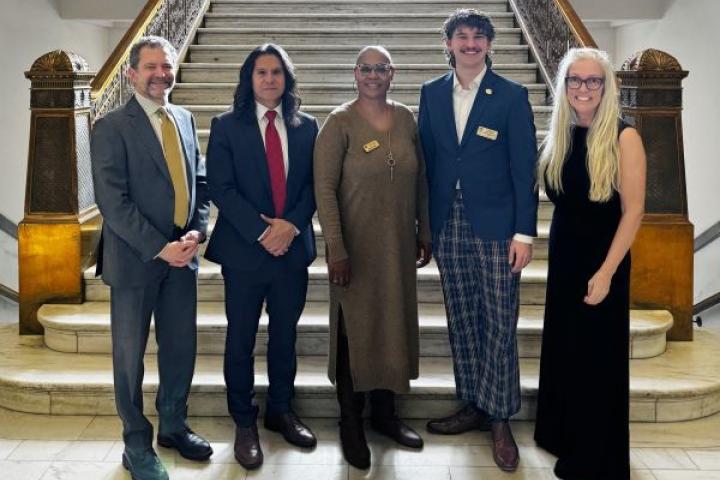Issue
May 2025
CU Research Changes Lives Every Day
The value of higher education and the role universities play in our nation’s research efforts remain at the center of a fiery debate that is sweeping our country. I firmly believe our great nation’s unparalleled leadership in the world is in no small part due to the extraordinary research that happens at America’s universities.
The value of higher education and the role universities play in our nation’s research efforts remain at the center of a fiery debate that is sweeping our country. I firmly believe our great nation’s unparalleled leadership in the world is in no small part due to the extraordinary research that happens at America’s universities. At the University of Colorado, we're well known for our scholarly and creative work as well as our entrepreneurial efforts to move from invention to products impacting people’s lives. While the debate on federal funding of scholarly and creative work also impacts all of CU, I want to focus on federally funded science, technology, engineering, math and health sciences research in this newsletter.
The research conducted across our campuses is foundational to daily life. It contributes to everything from landing planes safely to launching an independent entrepreneur’s next small business to ensuring that our students are prepared to succeed and lead in emerging fields and a world that’s always changing.
We tend to think of research as abstract and something done in a remote lab that’s beyond our comprehension. And while some of the work being done at CU is difficult to wrap our brains around, its impact is very real and easily grasped. Every day, our amazing people are seeking new knowledge and ultimately applying that knowledge to the urgent needs of our state, region, nation and world. Our researchers start with a problem and work toward a solution – and, more often than not, find solutions that change lives and make our world better.
Take, for example, the critical work happening at CU Boulder’s Cooperative Institute for Research in Environmental Sciences (CIRES), which has received essential funding from the National Oceanic and Atmospheric Administration (NOAA) since 1967. We’ve been highly engaged with our nation’s leaders to ensure this institute’s critical work (and roughly 900 jobs) continues.
Scientists at CIRES conduct research in weather – including space weather – wildfire and water. Their work is used hourly by national and international aviation companies to determine flight paths and ensure safety. In partnership with NOAA's Space Weather Prediction Center, they monitor radiation in space and provide space weather advisories to international airlines, informing them of impacts to flight paths to ensure passengers and crew don’t get exposed to unsafe levels of radiation when traveling around the globe.
CIRES water resource research and analysis are vital to everything from individual irrigation decisions that impact farmers in Colorado’s rural counties to large-scale management of the Colorado River, which is the lifeblood of seven states. Our ability to predict the movements of wildfires, tornadoes and other natural disasters has direct implications for the safety and economic wellbeing of our communities as well as our individual neighborhoods and homes.
Then there’s quantum physics, the revolutionary “physics of the small.” CU is the fulcrum of developing and connecting breakthroughs using quantum in computing, drug development, energy production and a host of other areas. We’re also creating educational pathways to help students find their way into thousands of career options that include quantum technology at their core.
In 2023, a coalition of more than 70 private, public and government organizations across numerous sectors in the Mountain West – including the state of Colorado, CU Anschutz, CU Boulder and CU Denver – was designated a Regional Technology and Innovation Hub by the U.S. Department of Commerce focused on the advancement of the quantum industry and recognizing Colorado as home to the nation’s largest cluster of quantum businesses.
CU’s leadership in quantum research is demonstrated by efforts such as those at the Center for Drug Discovery in CU’s Skaggs School of Pharmacy and Pharmaceutical Sciences, which is using quantum technologies to speed the drug discovery process and develop future medications. Or the work at UCCS to use quantum to reduce the use of electric power in artificial intelligence memory chips by a factor of one million. This research is poised to protect our electric infrastructure, even as it’s enriching our students’ education, equipping them with knowledge and skills that can advance their careers in a host of companies.
CU is also a longstanding leader of translating research into patents for inventions and innovations, the first step toward launching a new technology into a full-fledged business. In its most recent ranking of the top 100 U.S. universities granted U.S utility patents, the National Academy of Inventors – an organization of U.S. and international universities, governmental agencies and non-profit research institutes – placed CU at No. 18 in the nation.
From the world’s first artificial lens implanted directly into the eye that delivers medication for the sustained treatment of various eye conditions, to ultra-slim gastroscope technology specifically designed for pediatric patients, to software that improves GPS reliability in weak-signal environments – all patents that originated at CU – it’s easy to see why we’re so highly ranked.
These are just a fraction of the many, many examples of research and innovation happening across our campuses. CU is uniquely positioned to do this work and provide these benefits, bridging new knowledge that advances understanding with practical applications that improve our lives, our security and our wellbeing.
It’s the reason that I’m working around the clock with our campus chancellors and CU’s federal relations team to elevate and protect the federal funding we receive where we can. And while I may not sign on to every high-profile letter you see, please know that CU is actively engaged with policy makers to advocate for our amazing university. We know our Congressional delegation understands the critical, real-world impacts of this research – as well as its vital economic impact – and we are deeply grateful when they champion its continuation.
So, the next time higher education and research come up in conversation, please mention the tremendous work happening at CU and at universities nationwide. Help share these, and the many other stories we’re all so proud to tell.



